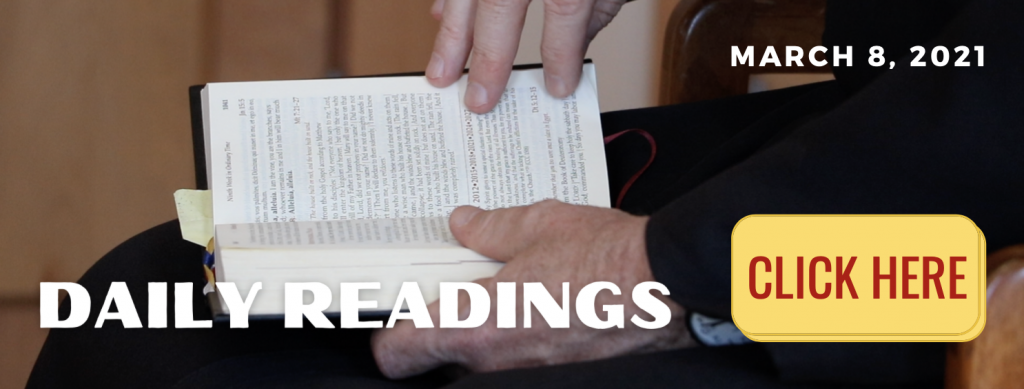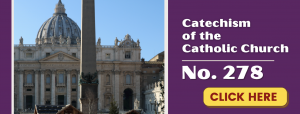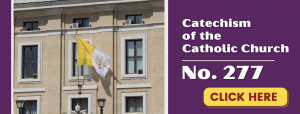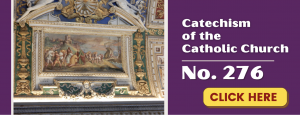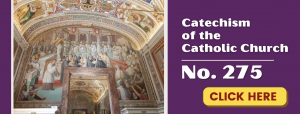Monday of the Third Week of Lent
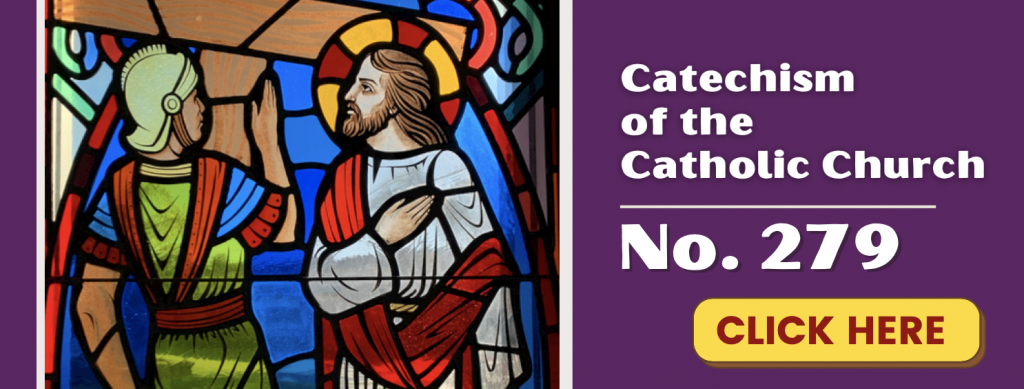

“For greater things you were born.” (Ven. Mother Luisita)
MONDAY, March 8th Lk. 4: 24-30 “When the people in the synagogue heard this, they were all filled with fury. They rose up, drove him out of the town, and led him to the brow of the hill on which their town had been built, to hurl him down headlong. But he passed through the midst of them and went away.”
- These thoughts occur. They intended to throw him over the brow of the hill, but he disappeared. Jesus will determine the day and the way in which He will be taken and put to death!
- Saint Paul writes this about the Jews who rejected Christ and put Him to death. “Again I ask: Did they stumble so as to fall beyond recovery? Not at all! Rather, because of their transgression, salvation has come to the Gentiles to make Israel envious.”
- Paul goes on, “As far as the gospel is concerned, they are enemies for your sake; but as far as election is concerned, they are loved on account of the patriarchs, for God’s gifts and his call are irrevocable. Just as you who were at one time disobedient to God have now received mercy as a result of their disobedience, so they too have now become disobedient in order that they too may now receive mercy as a result of God’s mercy to you. For God has bound everyone over to disobedience so that he may have mercy on them all.
- HOW GREAT IS OUR GOD!!!
THE INFINITE VALUE OF YOUR SOUL by Fr. Ed Broom, OMV
Imagine discovering in your backyard a treasure of gold! Imagine being bequeathed ten diamonds, each of them worth more than a million dollars! Once again, imagine receiving an inheritance—an enormous mansion on a luxurious plot of land and it’s all yours! Finally, imagine winning the 50-million dollar lottery! Of course, on a human and natural plane we would all rejoice to the skies, and relax with the awareness that the rest of our life will be luxury, pleasure, ease and indescribable comfort.
Beyond a shadow of a doubt, those immersed in the worldly, paganistic, and materialistic mindset would long for any one of the above scenarios. Why? The whole thrust of their life is based on purely materialistic possession and gain.
Let us now flip the coin and turn in the opposite direction, and meditate upon the value, now through the eyes of God, of one soul, of one immortal soul, your own immortal soul. In all truth, your individual, personal, and unique soul, your immortal soul has much more value than all of the riches described above. In the eyes of God—the God of Life, the God of Truth, and the God of Love, your soul is worth more than the whole created universe. Saint Peter says that our soul was not redeemed or bought back by the blood of goats or heifers, nor gold or silver, but was redeemed by the Blood of Jesus! How precious and valuable are our souls—redeemed by the Blood of the Lamb of God who takes away the sins of the world! (cf 1Pt. 1:18-19)
This being said, let us reflect together, even for a few short minutes, on the reality, importance, and grandeur of your immortal soul. The following are concrete points for your reflection, meditation, and prayer.
- ORIGIN OF YOUR SOUL. At one time your soul did not exist. It’s coming into existence, its origin, came from God in the precise moment of time and manner that God so willed. When? Precisely in the very moment of your conception in the womb of your mother was when your immortal soul came into existence. This existence of your soul will never cease, in time and for eternity!
- IMMORTALITY. It is precisely this point—IMMORTALITY! By immortal is meant quite simply this: it is destined to exist forever and ever and ever. In a real sense it is God-like because God can never cease to exist.
- HUMAN BIRTH AND SUPERNATURAL BIRTH AND THE SOUL. Every year with immense joy we celebrate our Birthday and the Birthdays of our loved ones. Ice-cream, cake, candles, balloons, and gifts make up the essential qualities of the celebration. Often many relatives and friends flock to celebrate the Birthday-Boy or Birthday-Girl! However, it should be recalled and celebrated with even greater joy the Spiritual Birthday of every Christian, and every Christian Catholic. Of course, we are referring to the day of our Baptism; this was our Spiritual Birthday. This was the day and moment in which our soul underwent a radical transformation, moving from the natural plane to the supernatural plane; if you like, a quantum leap!
- THE SOUL’S RADICAL TRANSFORMATION THROUGH BAPTISM. In the very moment that the priest/deacon baptized us pronouncing our name saying: “(Name), I baptize you in the name of the Father and the Son and the Holy Spirit”, our soul received the three Divine Guests to inhabit our soul: the Father, the Son, and the Holy Spirit! We should strive to recall this profound and penetrating reality of our great dignity through Baptism—the profound and mysterious fact that we are truly living Temples of the Blessed Trinity! Sons and Daughters of God!
- TARNISHING AND BLACKENING THE SOUL. Even though the Sacrament of Baptism removes Original Sin and imbues and permeates the soul with the Blessed Trinity, due to the abuse of our freedom, it often happens that the beauty of our soul is tarnished, darkened, and even blackened by the reality of sin, and unfortunately the reality of mortal sin. Honesty before God and our own conscience demands the humble admission of falling into mortal sin and darkening, sullying, and damaging the greatest Gift that God has given to us—our immortal soul! Living in denial of sin, especially mortal sin, can be catastrophic for us in time and for all eternity.
- CONFESSION: THE CLEANSING OF THE SOUL! Following on the heels of the reality of mortal sin is the keen awareness of God’s greatest attribute—that of His Infinite Mercy. Pope Saint John Paul II has stated that Mercy is the second name for God’s Love. God’s Mercy is channeled through His Church, known as the Mystical Body of Christ. In concrete practice, God’s Mercy is mediated through His Sacraments. Reconciliation, Penance, Confession are various names for the Sacrament that can transform our souls from being tarnished, sullied, even blackened by the ugly stain of mortal sin into once again glorious, pure, and resplendent palaces of the Lord of Lords and King of Kings, Majestic Mansions of the dwelling place of the Blessed Trinity—Father, Son, and Holy Spirit!
- VIGILANCE: DEFEND AND PROTECT THE IMPORTANCE AND BEAUTY OF THE SOUL. How often have we come across homes that have various levels of protection? Let us count the various protective barriers to the home: barbwire, iron gates, pointed iron bars, iron/brass doors, loud alarms, angry pit-bulls, security cameras, and even at times security guards. Given the fact that our immortal soul is worth more than the whole created universe, just one soul, then logic would tell us that we should use all the spiritual means available to protect our soul from robbers and thieves that are on the constant lookout to rob us of sanctifying grace! In all honesty, how little we do to protect our soul from mortal poison and danger, and how little we do or have done to protect our children and families from the all-intrusive thieves on the prowl to steal the precious grace in their souls. Starting now: let us be more vigilant to protect and defend our soul, and those of our families, from these prowling thieves, whose names are the devil, the flesh, and the world!
- CALL TO MIND OUR DIGNITY AND DESTINY. Constantly, even on a daily basis, we should remind ourselves of an essential part of Principle and Foundation—our purpose and end in life. It was Saint Thomas Aquinas who articulated this truth so clearly: your immortal soul is worth more than the whole created universe. All God’s natural creation pales in the face of the reality of one immortal soul and that is your own immortal soul! Let us frequently call to mind our dignity and our destiny. Our dignity? Sons and Daughters of God through the Sacrament of Baptism! Our destiny? To be a member of the Court of Heaven—seeing face to face the Father, the Son, and the Holy Spirit, “For now we see in a mirror dimly, but then face to face. Now I know in part; then I shall know fully, even as I have been fully known.” (1Cor 13:12)—with Mary as our Mother and Queen, the angels our companions, and the saints our best of friends for all eternity!
- TRUE LOVE. Saint Thomas Aquinas defines love in these words: “Love (charity) is willing the good of the other.” What then is the greatest good for a human person? It is the salvation of their IMMORTAL SOUL!!!If we truly love God and love what God loves, then we should love our neighbor and work ardently, constantly, fervently, incessantly for the salvation of our soul and the souls of others. Saint James states the following with respect to the salvation of a soul: “My brothers, if anyone among you should stray from the truth and someone brings him back, he should know that whoever brings back a sinner from the error of his way will save his soul from death and will cover a multitude of sins.” (Jas. 5: 19-20)
- MARY AND OUR SOUL. On a very important and concluding note, let us entrust our life, our temptations, our struggles, our desires, our aspirations, and the salvation of our immortal soul to Mary. Aside from God Himself, there is no person in the universe who cares and desires the health, protection, and salvation of our immortal soul more than the Blessed Virgin Mary. Let us pray as many Rosaries as possible and entrust the hour and moment of our death into the hands and Immaculate Heart of Mary. She will lead our soul safety to the port of salvation—the Sacred Heart of Jesus!
Copyright 2021 Oblates of the Virgin Mary St. Peter Chanel Church, Hawaiian Gardens, CA
